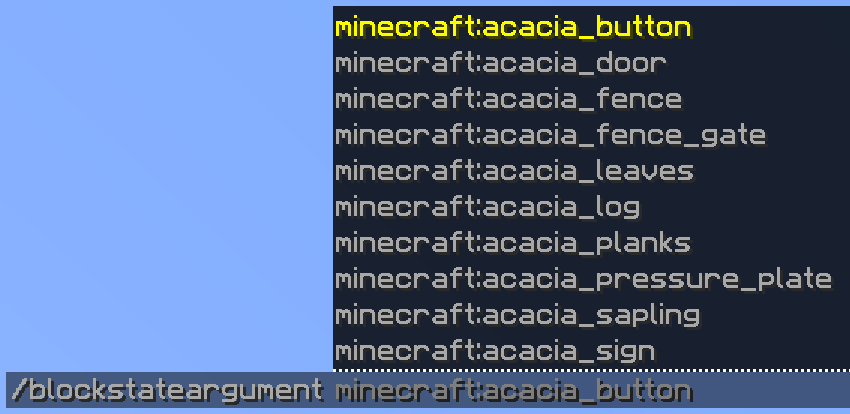BlockState arguments

The BlockStateArgument is used to represent data about blocks in the world. These refer to any blocks that have data or states, such as dispensers, signs, doors and pistons. The BlockStateArgument creates a Bukkit BlockData object when used.
Developer's Note:
Make sure to not confuse the cast type with
BlockState. The naming of this argument refers to the internal Minecraft vanilla argument naming convention - this argument casts toBlockDataand NOTBlockState.
Example - Setting a block
Say we want a simple command to set the block that you're looking at. We'll use the following command syntax:
/set <block>
And then we can simply set our block using setBlockData():
new CommandAPICommand("set")
.withArguments(new BlockStateArgument("block"))
.executesPlayer((player, args) -> {
BlockData blockdata = (BlockData) args.get("block");
Block targetBlock = player.getTargetBlockExact(256);
// Set the block, along with its data
targetBlock.setType(blockdata.getMaterial());
targetBlock.getState().setBlockData(blockdata);
})
.register();
CommandAPICommand("set")
.withArguments(BlockStateArgument("block"))
.executesPlayer(PlayerCommandExecutor { player, args ->
val blockdata = args["block"] as BlockData
val targetBlock = player.getTargetBlockExact(256)
// Set the block, along with its data
targetBlock?.type = blockdata.material
targetBlock?.state?.blockData = blockdata
})
.register()
commandAPICommand("set") {
blockStateArgument("block")
playerExecutor { player, args ->
val blockdata = args["block"] as BlockData
val targetBlock = player.getTargetBlockExact(256)
// Set the block, along with its data
targetBlock?.type = blockdata.material
targetBlock?.state?.blockData = blockdata
}
}